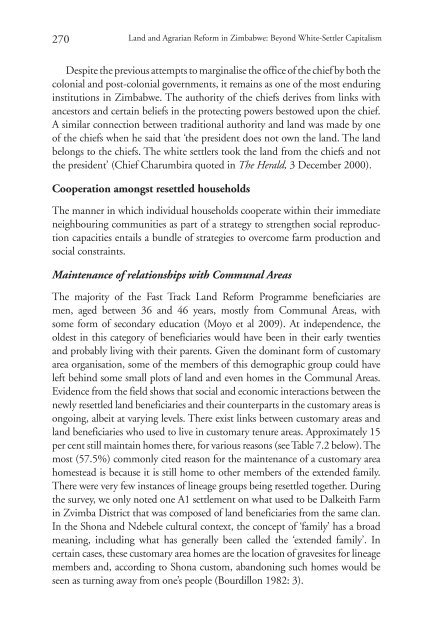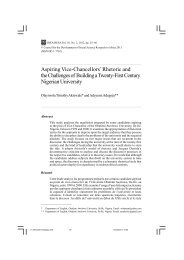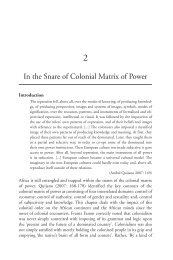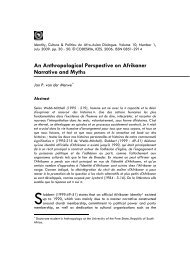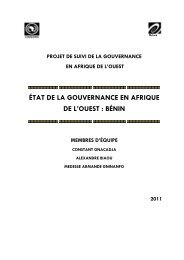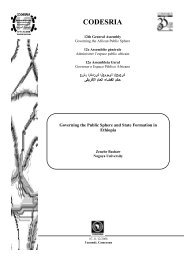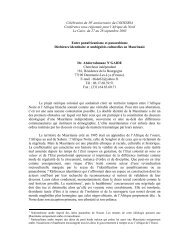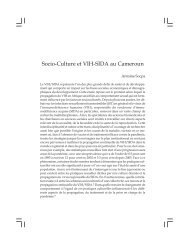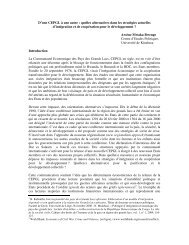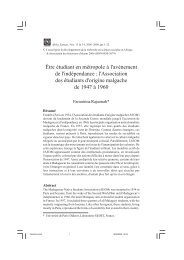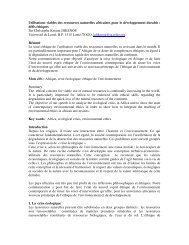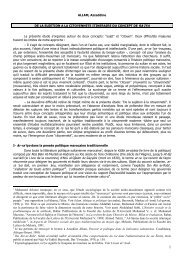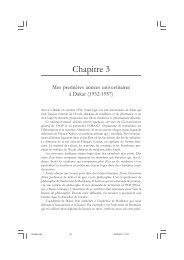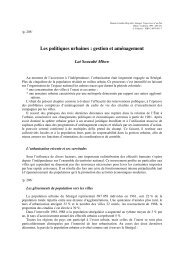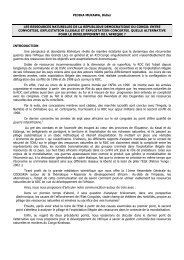Land and Agrarian Reform in Former Settler Colonial ... - codesria
Land and Agrarian Reform in Former Settler Colonial ... - codesria
Land and Agrarian Reform in Former Settler Colonial ... - codesria
You also want an ePaper? Increase the reach of your titles
YUMPU automatically turns print PDFs into web optimized ePapers that Google loves.
270<br />
<strong>L<strong>and</strong></strong> <strong>and</strong> <strong>Agrarian</strong> <strong>Reform</strong> <strong>in</strong> Zimbabwe: Beyond White-<strong>Settler</strong> Capitalism<br />
Despite the previous attempts to marg<strong>in</strong>alise the office of the chief by both the<br />
colonial <strong>and</strong> post-colonial governments, it rema<strong>in</strong>s as one of the most endur<strong>in</strong>g<br />
<strong>in</strong>stitutions <strong>in</strong> Zimbabwe. The authority of the chiefs derives from l<strong>in</strong>ks with<br />
ancestors <strong>and</strong> certa<strong>in</strong> beliefs <strong>in</strong> the protect<strong>in</strong>g powers bestowed upon the chief.<br />
A similar connection between traditional authority <strong>and</strong> l<strong>and</strong> was made by one<br />
of the chiefs when he said that ‘the president does not own the l<strong>and</strong>. The l<strong>and</strong><br />
belongs to the chiefs. The white settlers took the l<strong>and</strong> from the chiefs <strong>and</strong> not<br />
the president’ (Chief Charumbira quoted <strong>in</strong> The Herald, 3 December 2000).<br />
Cooperation amongst resettled households<br />
The manner <strong>in</strong> which <strong>in</strong>dividual households cooperate with<strong>in</strong> their immediate<br />
neighbour<strong>in</strong>g communities as part of a strategy to strengthen social reproduction<br />
capacities entails a bundle of strategies to overcome farm production <strong>and</strong><br />
social constra<strong>in</strong>ts.<br />
Ma<strong>in</strong>tenance of relationships with Communal Areas<br />
The majority of the Fast Track <strong>L<strong>and</strong></strong> <strong>Reform</strong> Programme beneficiaries are<br />
men, aged between 36 <strong>and</strong> 46 years, mostly from Communal Areas, with<br />
some form of secondary education (Moyo et al 2009). At <strong>in</strong>dependence, the<br />
oldest <strong>in</strong> this category of beneficiaries would have been <strong>in</strong> their early twenties<br />
<strong>and</strong> probably liv<strong>in</strong>g with their parents. Given the dom<strong>in</strong>ant form of customary<br />
area organisation, some of the members of this demographic group could have<br />
left beh<strong>in</strong>d some small plots of l<strong>and</strong> <strong>and</strong> even homes <strong>in</strong> the Communal Areas.<br />
Evidence from the field shows that social <strong>and</strong> economic <strong>in</strong>teractions between the<br />
newly resettled l<strong>and</strong> beneficiaries <strong>and</strong> their counterparts <strong>in</strong> the customary areas is<br />
ongo<strong>in</strong>g, albeit at vary<strong>in</strong>g levels. There exist l<strong>in</strong>ks between customary areas <strong>and</strong><br />
l<strong>and</strong> beneficiaries who used to live <strong>in</strong> customary tenure areas. Approximately 15<br />
per cent still ma<strong>in</strong>ta<strong>in</strong> homes there, for various reasons (see Table 7.2 below). The<br />
most (57.5%) commonly cited reason for the ma<strong>in</strong>tenance of a customary area<br />
homestead is because it is still home to other members of the extended family.<br />
There were very few <strong>in</strong>stances of l<strong>in</strong>eage groups be<strong>in</strong>g resettled together. Dur<strong>in</strong>g<br />
the survey, we only noted one A1 settlement on what used to be Dalkeith Farm<br />
<strong>in</strong> Zvimba District that was composed of l<strong>and</strong> beneficiaries from the same clan.<br />
In the Shona <strong>and</strong> Ndebele cultural context, the concept of ‘family’ has a broad<br />
mean<strong>in</strong>g, <strong>in</strong>clud<strong>in</strong>g what has generally been called the ‘extended family’. In<br />
certa<strong>in</strong> cases, these customary area homes are the location of gravesites for l<strong>in</strong>eage<br />
members <strong>and</strong>, accord<strong>in</strong>g to Shona custom, ab<strong>and</strong>on<strong>in</strong>g such homes would be<br />
seen as turn<strong>in</strong>g away from one’s people (Bourdillon 1982: 3).<br />
<strong>L<strong>and</strong></strong> <strong>and</strong> <strong>Agrarian</strong> <strong>Reform</strong> <strong>in</strong> <strong>Former</strong> <strong>Settler</strong> <strong>Colonial</strong> Zimbabwe.<strong>in</strong>dd 270 28/03/2013 12:57:30


